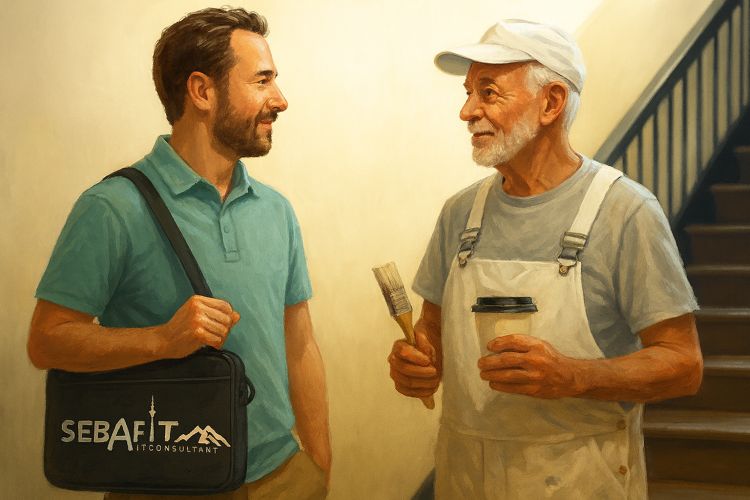How a casual chat with a painter taught me more about communication than a dozen tech seminars.
Not long ago, I found myself in a dimly lit stairwell, engaged in a spontaneous conversation with a painter. No elevator. No fancy boardroom. Just two people crossing paths at the right moment.
He was gripping a brush in one hand and a coffee in the other — clearly on break, yet curious. He glanced at my bag with a logo and asked, “So, what do you do?”
I opened my mouth to launch into my usual consulting elevator pitch — the one I’d refined for C-level clients and investor meetings — but something stopped me.
This wasn’t an elevator. This was a stairwell.
And this wasn’t a CTO. This was a craftsman who probably couldn’t care less about digital transformation, API integrations or agile implementation roadmaps.
So instead, I said:
“I help people like you avoid stress when it comes to computers and websites.”
He laughed.
Then asked, “Like what kind of stress?”
And just like that, we had a conversation. A real one.
About spam emails, slow websites, his struggle with a broken contact form, and the local printer who tried (but failed) to build him a website five years ago.

The Power of Speaking Your Client’s Language
This wasn’t just a friendly exchange — it was a masterclass in communication. One that I hadn’t planned. One that didn’t need slides or jargon.
We often spend countless hours perfecting our elevator pitch — that one-size-fits-all summary of who we are and what we do. But real life doesn’t come with an elevator chime. It comes with messy, unexpected, beautifully human moments.
Moments that demand adaptability. And authenticity.
That’s why I now call this my Staircase Pitch.
It’s shorter.
It’s simpler.
And it meets people exactly where they are — not where I think they should be.
Lessons From the Stairwell
Here are a few takeaways that stuck with me:
1. People don’t buy services. They buy solutions to their stress.
My painter friend didn’t care about uptime monitoring or GDPR compliance.
He cared about emails not reaching his clients and a slow website that made him look unprofessional.
That’s where our expertise becomes valuable — not in abstract features, but in the direct relief we offer.
2. Your message must adapt to your audience.
The same pitch that lands with a startup founder might overwhelm a local artisan.
Consulting isn’t just about knowing tech — it’s about translating tech into benefit.
If you can’t explain what you do to your uncle at a family BBQ, you might not understand it well enough yourself.
3. Authenticity is your best business card.
I didn’t try to impress the painter with buzzwords.
I simply listened and offered honest insight.
No pressure. No sales tactics. Just relevance and honesty. That’s how trust begins.
So, what’s your Staircase Pitch?
If you’re in IT, consulting, or any client-facing role, take a moment and ask yourself:
- Can I explain what I do in a way that a non-tech person would understand — and care about?
- Do I adjust my message based on the context — or do I default to a rehearsed speech?
- Do I listen before I talk?
The ability to adapt your message isn’t a soft skill.
It’s your most important business tool.
Final Thought
The irony? That brief stairwell encounter probably landed me a future client — or at the very least, a great recommendation.
So the next time you’re rehearsing your elevator pitch…
remember that most opportunities don’t come in elevators.
They come on stairs.
In cafés.
At bus stops.
On construction sites.
Be ready to meet people where they are.
Speak their language.
And help them breathe a little easier when it comes to tech.
That’s what real consulting is all about.
Written by: Sebastian Fiddicke
Founder & Consultant at Sebaf IT
Authentic solutions. No tech babble.
Want to simplify your IT?
Let’s talk – even if it’s just over coffee.
Here’s to contact me.
